Fun is the formula at Atomic Workshop Restaurant Group, where visionary chef-owners Stuart Brioza and Nicole Krasinski are blending culinary alchemy with outstanding hospitality.
On the 1500 block of Fillmore Street, the lines start forming early. Twin queues snake along the facades of two neighbors: The Progress, its frosted windows partially veiled by creeping fig, and State Bird Provisions, a warm glow emanating from within. A regular greets his friend, a first-time visitor, and explains that both restaurants—along with The Anchovy Bar around the corner—are owned by the same group. “Eventually they’ll own the whole block,” the friend jokes. “Oh, I hope so,” he responds. “I wouldn’t be opposed to that.”

All three establishments fall under the umbrella of Atomic Workshop Restaurant Group, led by chefs, co-owners, and husband-and-wife duo Stuart Brioza and Nicole Krasinski. The idea of a creative workshop based around the culinary arts makes sense for the Bay Area natives, who met as photography students at DeAnza College. Brioza attended The Culinary Institute of America in Hyde Park, New York, before they reunited to hone their respective crafts in Chicago and Northern Michigan. They later returned to San Francisco to work at Rubicon, where Brioza served as executive chef and Krasinski led the pastry program. Their cooking style resists tidy definition as it’s not rooted in personal heritage, but a kind of global fluency: “It [doesn’t] speak to personal background,” Brioza says. “It just spoke to being people of the universe. People who travel, who experience, who are charmed by tradition, by non-tradition, and by cultures.” That openness—to influence, to evolution, to change—is baked into each of their restaurants. “A lot of that has to do with Stuart’s background,” says Krasinski. “He learned traditional French cooking, which laid this very stable foundation, so then he could veer off in other directions.”
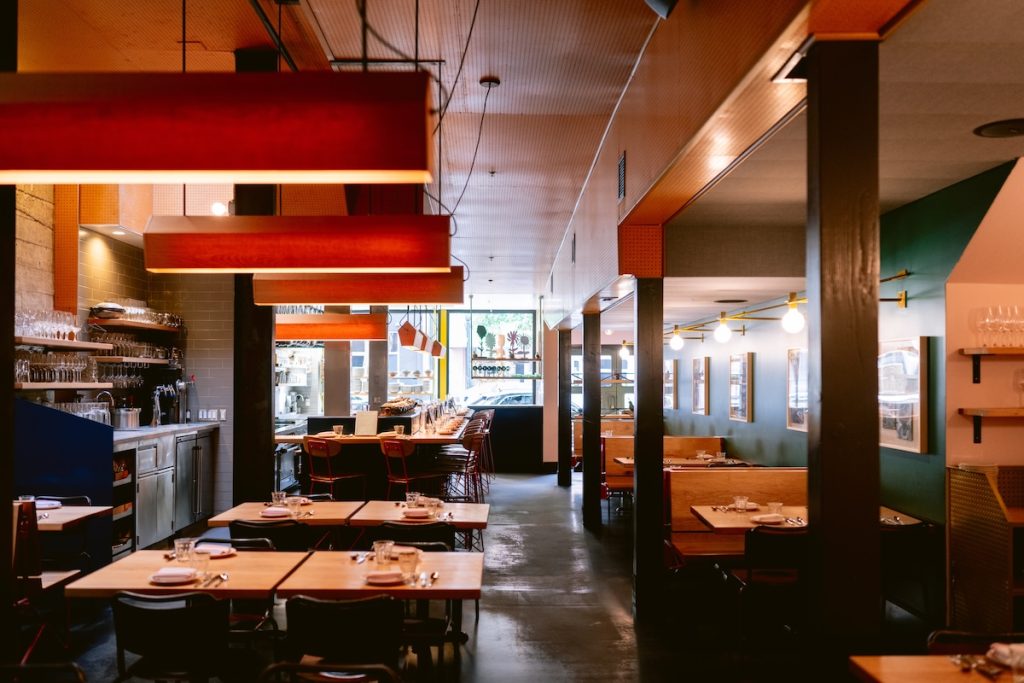
As I stand outside waiting for the doors to open, I find it hard to believe State Bird opened back in 2012. The energy on the street is more akin to a grand opening—electric and anticipatory. It reminds me of the line I was in just a few weeks ago for Four Kings, which recently joined State Bird Provisions in the Bon Appétit hall of fame as a “Best New Restaurant” (State Bird was named to the list seven months after its opening). The crowd peers eagerly through the front window where the kitchen team is preparing small plates for the restaurant’s signature dim sum-style service. A motley of enticing bites are set on wheeled carts, ready to roll.
At 5:30pm, an employee steps out to welcome the crowd like a party host. After I’m seated, the server explains the dim-sum concept and marks the dishes they offer on their a la carte menu as single portions for solo diners. Then, the action starts. “Bring it on,” says a couple at the end of the counter, who have snagged a prime spot as the seats closest to the kitchen exit. Their server slides bowls of smoked trout dip and potato chips in front of them, a State Bird staple that has become so popular it’s earned a permanent spot on the menu. I can see, and taste, why—the creamy, smoky dip is swirled with their spin on a ravigote, a vibrant green concoction with a mouthwatering zing from sherry vinegar and capers. “Let’s have at it,” they say to the next offer: Hog Island Sweetwaters dressed with a funky kraut-style kohlrabi, toasted sesame, and a drizzle of togarashi oil.
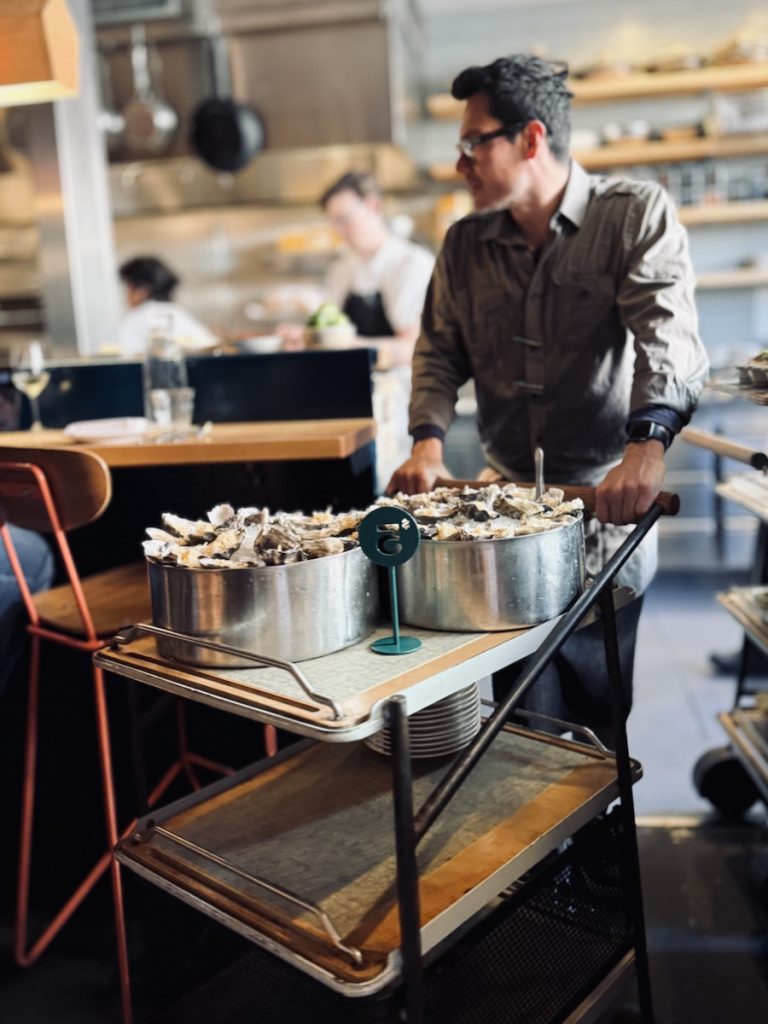
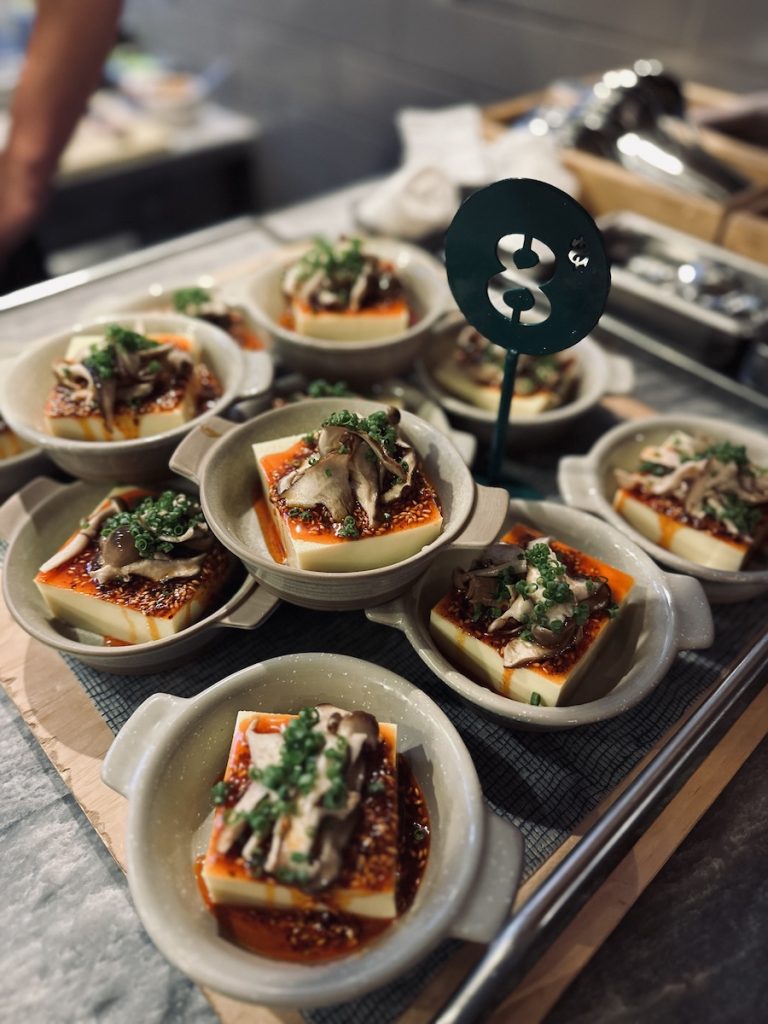
I’m joined by a fellow diner flying solo, who declares that this is her self-care day: spa in the afternoon, State Bird in the evening. Her head swivels when the lilikoi-chile BBQ & mint pork ribs come by, and it doesn’t take long for the empty real estate in front of her to resemble mine—crowded, chaotic, and deliciously overrun. Meanwhile, in the open kitchen, cooks are spinning squeeze bottles of condiments, calling back orders—“eight whole birds!”—and unveiling trays of delicate financiers. Golden-brown folds of roti hit the pass, ready to be served with a spiced lentil hummus crowned with morels and avocado. As he’s waiting to pick up an order, one of the servers leans over conspiratorially: “Want to know a fun fact?” We nod like schoolkids. He points to one of the cooks, and we peer over the counter, grating fresh wasabi on what he explains is a paddle made of sharkskin.
State Bird bills itself as a restaurant “without any programmed elements,” with a goal “to cook with absolute freedom and flexibility.” That ethos comes through loud and clear: it’s a restaurant where the ever-evolving menu of small plates delivers big flavors drawn from curiosity and cultural mashups. The ephemeral nature of its menu also gives State Bird the quality of being a living thing that’s ever-changing. All around me, returning diners chat with the servers, discussing favorites and fleeting dishes. With a 2015 James Beard Award for Best Chef: West under its belt, the restaurant has more than earned its cred—but awards alone don’t capture the charm. As a diner, State Bird is gleefully unpredictable, accompanied by the thrill of making spontaneous decisions as a tray of something intriguing passes by. There’s also the discovery of textures and flavors that you didn’t even know you were craving. For me, that illuminating bite was the pork belly salad. Another staple of its menu, these crisp cubes are brined, braised, and finally fried to achieve its prized crust with a luscious melt-in-your-mouth interior. Nestled with orange wedges, fresh cilantro, and Thai basil, then dressed in a fish sauce vinaigrette, the dish hits every note. It’s criminally good—in fact, in the restaurant’s early days, someone walked off with an entire slab of the braised belly that had been left unattended out back.
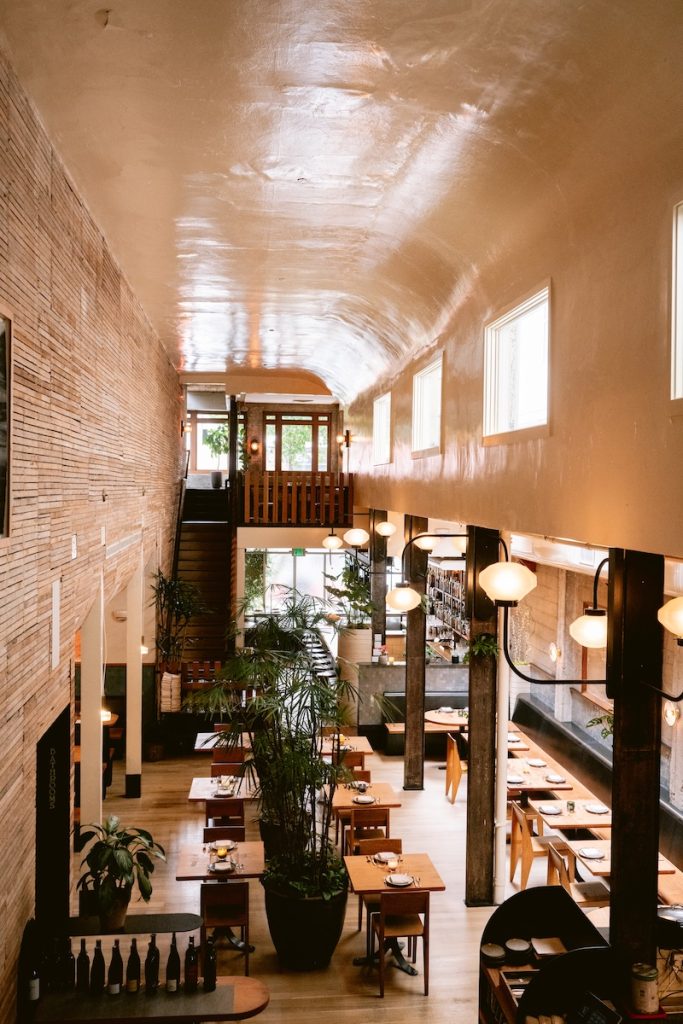
Next to the liveliness of State Bird, The Progress offers a more intimate hideout. Housed in a building born as a silent film theater, it now buzzes with a sophisticated energy. Candlelight flickers against wood-paneled walls, and bamboo palms float above date night couples and friends deep in the kind of conversations that unfold over good wine (though I’d also recommend the milk punch). If the fast-paced setting of State Bird feels like “dining for sport,” then The Progress makes eating a ritual. The restaurant is driven by a whole-animal, whole-vegetable philosophy, which honors its local farm relationships and celebrates the abundance of Northern California. There’s a reverence in the way the ingredients and dishes are approached. That’s not to say it’s not fun—I think most people who know Brioza and Krasinski would find it hard to believe they would have a restaurant that didn’t incorporate some element of playfulness. They may not take themselves too seriously, but they do the quality of ingredients.
There are incredibly thoughtful dishes, like the brown butter seaweed noodles, which are a lesson in umami. The springy housemade pasta is laced with oyster mushrooms in an earthy, vegetal dashi—not the traditional Japanese version you’re familiar with, but an intensely savory housemade version of it that utilizes aromatics like ginger and garlic. The dashi is further deepened with tomato and kale, and garnished with a heap of bonito flakes, gently unfurling from the heat of the dish. Brown butter adds a nutty warmth in addition to toasted sesame seeds, which have become apparent as a favorite ingredient across their restaurants. This dish feels like a union of land and sea—a walk through sun-drenched fields, breathing in salt air along the coast.

Then, there’s whimsical dishes like the “caviar cloud.” In a playful riff on mashed potatoes and the classic high-low pairing of caviar and potato chips, this delicate dome of aerated potato purée hides a scoop of caviar and crispy potato crunch beneath. There’s also the off-menu “Prog Dog,” which packs global flavor into a traditionally American form. A double-smoked frank on a perfectly grilled togarashi milk bread bun is topped with a glorious tangle of kimchi, rosemary aioli, fried shallots, and bonito flakes doing their signature shimmy. The kimchi leans savory, with an almost mouth-puckering quality, a perfect complement to the smoky sausage and milky-sweet bread. Each bite delivers a hit of smoky, tangy, spicy, and crunchy all at once. It’s like attending a Giants game in the afternoon, then keeping the party going at your favorite izakaya. On the sweet side, there’s Krasinski’s signature dessert, and a revelation in a shot glass. Affectionately nicknamed World Peace, it’s a velvety infusion made from Spanish peanuts steeped in milk and cream, then sweetened with muscovado sugar and brown rice syrup. Originally created for State Bird—and served since day one—it’s now available across all their restaurants. It’s sweet but not cloying, nostalgic yet unexpected, and a two-ounce pour that captures Krasinski’s approach as a pastry chef—offbeat and quietly brilliant.
Brioza and Krasinski have received a Michelin star for State Bird every year since 2014, as well as The Progress since 2017. Despite the accolades, they had a desire to stay rooted. When the Bon Appétit nod brought offers from New York, L.A., Montreal, they turned them down. “There’s a lot of opportunity and magic that happens in this city and in our little neighborhood,” says Krasinski. That said, their latest nomination—a 2025 James Beard Award for “Outstanding Restaurateur”—does feel slightly different, perhaps due to the perspective that comes with time. When the nominations were announced, Brioza was on a mountain at Palisades, skiing with their son. Krasinski was visiting friends in Chicago, and Elizabeth De Palmer—Atomic Workshop’s Managing Partner—was onsite at The Progress. “We all got on the phone,” he recalls. “I’m like, ‘This is crazy. I don’t even know what this means right now.’” Brioza recalls the early days, when he and Krasinski thought it was only a matter of time before the fanfare died down. “This is too crazy, too busy, too wild, for it to be forever,” he says. But what’s sustained them all this time isn’t hype—it’s authenticity. “We just didn’t [buy] into the fame. I was like, ‘I don’t believe anything that anybody’s written about me,’” he laughs. “The only thing we can control is what’s in these four walls.”
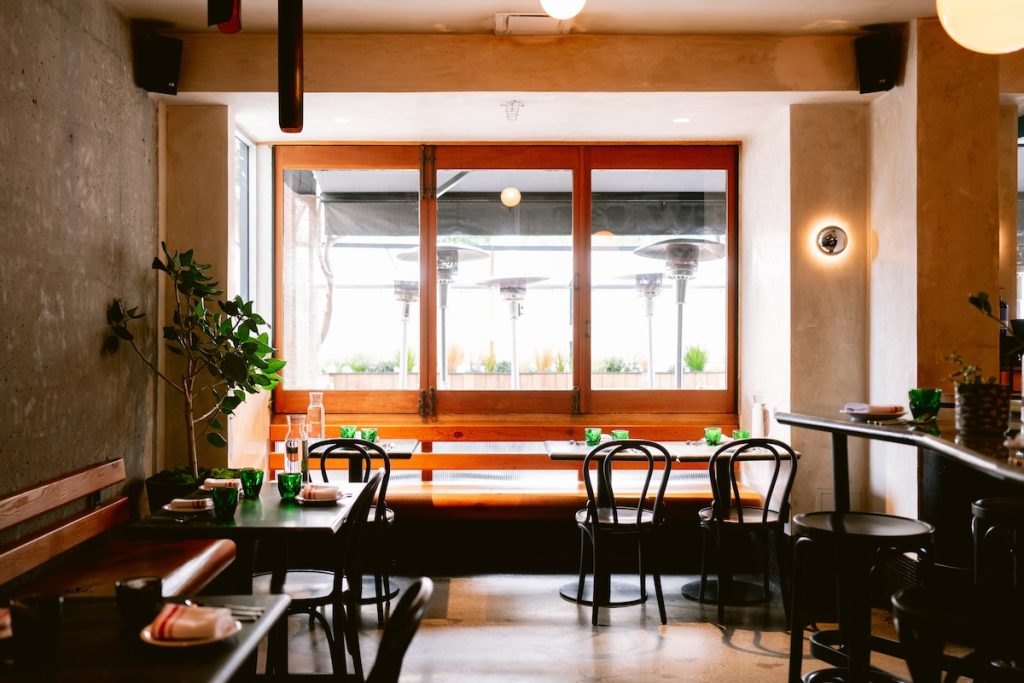
My final stop of the evening is The Anchovy Bar, which slaps you in the face with the intoxicating aroma of bread pan-frying in clarified butter as soon as you walk in the door. Opened in 2020, their most recent restaurant is a “small fish and wine bar,” though that only scratches the surface. It’s a love letter to eating lower on the food chain, committed to elevating humble ocean bounty such as—you guessed it—anchovies, in addition to oysters, mussels, clams, and seaweeds. As luck would have it, I’m visiting on the very first day of anchovy season, announced less than 24 hours prior via Instagram by their longtime local supplier, J&P Bait. It’s a smaller restaurant, about a quarter of the size of The Progress, and the vibe is somewhere between a neighborhood party and a European wine bar. An open kitchen hums with activity: chefs shucking oysters and squeezing sauces from a rainbow assortment of bottles lining the wall behind the garnish station. Conversations spill from table to table. There’s a joyful, food-loving camaraderie here—I’m wearing olive skewer earrings, and the woman next to me has a phone case depicting a stick of butter—that makes you feel like everyone’s in on something good, and by being there, now you are too.
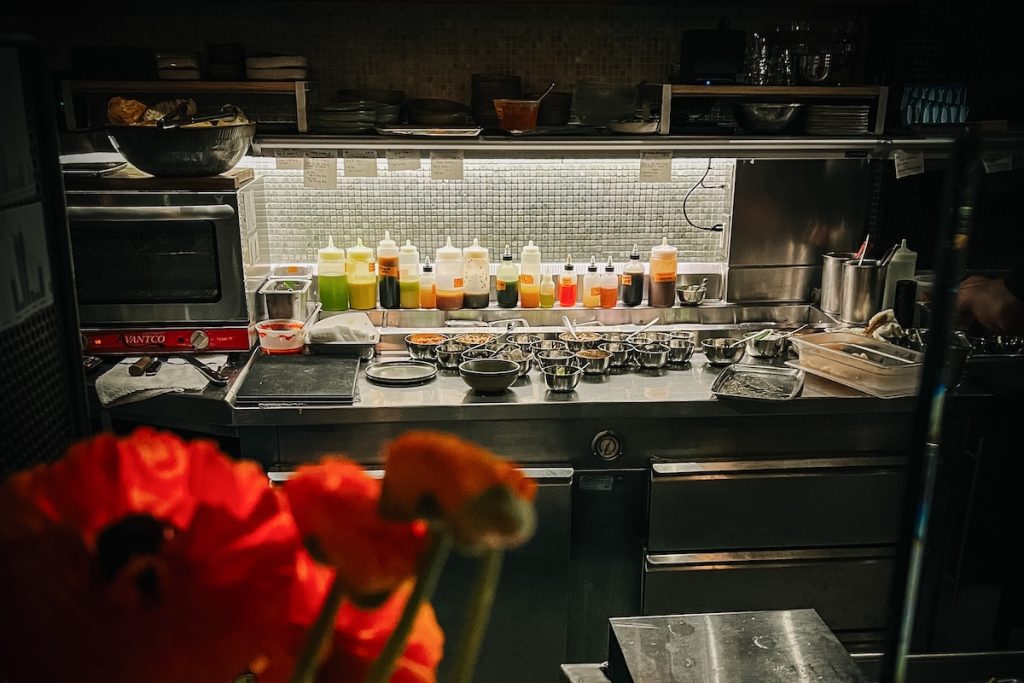
As it’s the first day of anchovy season, anchovies in purgatory have just hit the menu. Served still sizzling in a miniature cast iron dish, the anchovies are bathed not in a fiery tomato sauce, but a glorious pool of butter, garlic, chili oil, yuzu kosho, and lemon. Semicircles of fermented turnip and a sprinkle of togarashi add funk and fire. It’s garnished with red shiso and toasted sesame (of course). Their local anchovy toast will soon return to the menu: as striking as it tastes, the plump anchovies laid side-by-side in silvery formation are a reminder of why anchovies deserve the spotlight. The Anchovy Bar doesn’t just elevate the small fish—it builds an entire experience around it. There’s also something a bit magical about the fact that the local anchovies are caught in the waters between the Golden Gate Bridge and Alcatraz. What more of a sense of place could you get in San Francisco?
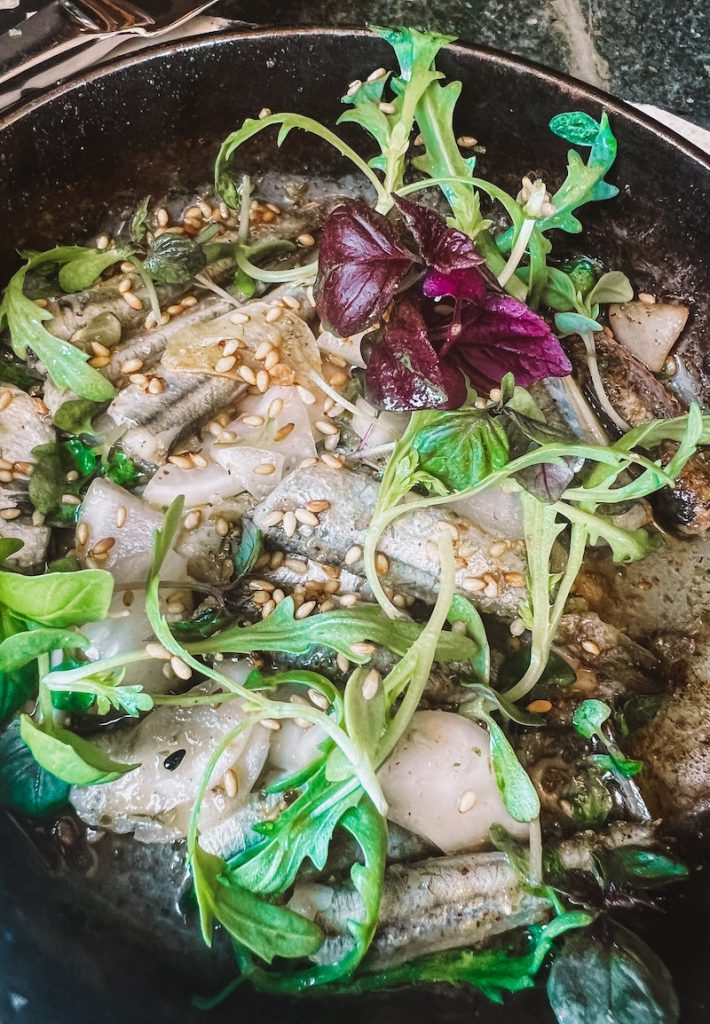
Despite the focus on local ingredients, Brioza and Krasinski will bring in an ingredient if it has unparalleled value—like Cantabrian anchovies, or the cashews they use in The Anchovy Bar’s famed anchovy sundae. Imported from Vietnam by their friends who own Red Boat—the beloved fish sauce company they’ve had a relationship with since opening State Bird—the cashews blew Brioza’s mind when he first tried them. “Nobody ever says that they’ve had the best cashew in their life,” he laughs. “That’s not something that you commonly hear.” Now, they’re an integral component of the coconut and candied anchovy crumble that adorns their vanilla and tamarind caramel sundae. Topped with a sprinkle of lime zest, it’s crispy, creamy, and balanced. It’s a dessert that has no fear of complexity, and makes me go: This is wild—but it works.
I could say the same about the restaurants under Atomic Workshop. Despite their distinct identities, all three are bound by a collective love of food and hospitality. Step into any of them and you’ll feel it: an easy, joyful energy amongst diners, and the palpable rhythm of a team who genuinely loves what they do, and loves doing it together. You’re enveloped in a kaleidoscope of sights, sounds, aromas, and flavors that tell you: this is where the magic happens.
The 2025 James Beard Award winners will be announced June 16, 2025.
Images by Steph Keay, Kristen Loken, and Ed Anderson
